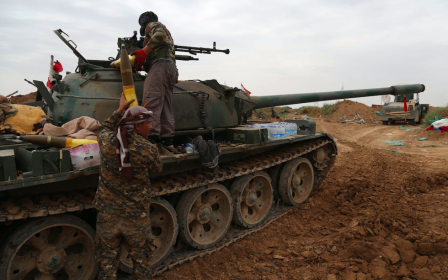Violence spikes as Syria peace talks set to resume

Syria's ceasefire appeared to be unravelling on Tuesday amid a surge of fighting, especially in northern Aleppo province, as peace talks were set to resume in Geneva.
Fresh concerns about the ceasefire were voiced by Iran, where United Nations Syria envoy Staffan de Mistura was holding talks with the key backer of President Bashar al-Assad.
Iran's Deputy Foreign Minister Hossein Amir Abdollahian told De Mistura that the recent increase in fighting was "disturbing and may interfere with the political process".
Washington had raised similar concerns about the ceasefire ahead of the talks due to start on Wednesday, which De Mistura has called "crucially important".
After meeting Abdollahian in Tehran, De Mistura expressed hope the truce would hold.
"We agreed that what is very important is that cessation of hostilities continues, that humanitarian aid reaches every Syrian, in particular of course those besieged areas, but every Syrian," he said.
"A political process leading to a political transition is now crucially urgent."
The Geneva talks opening on Wednesday will be the second round since President Bashar al-Assad's government and rebel forces agreed to the partial truce brokered by Moscow and Washington, which has largely held since 27 February.
The ceasefire has raised hopes for a resolution to the conflict that has killed more than 270,000 people and displaced half of the country's population.
Syria's commitment to a ceasefire and pledges to allow aid deliveries are slipping, putting the peace process on a more fragile footing, US Ambassador Samantha Power said on Tuesday.
De Mistura briefed the Security Council during a closed-door meeting, on the eve of the Geneva talks.
Power said after the meeting that Russia must put pressure on its Syrian ally to "get the regime back with the programme".
"Right now, there are signs that this is slipping and it is a much more delicate environment for De Mistura to convene political talks," said Power.
Meanwhile, pro-government forces on Tuesday pressed an advance against the town of al-Eis, held by al-Qaeda's local affiliate the Nusra Front, and allied rebels, the Syrian Observatory for Human Rights said.
Nusra and the rebels fought back, killing at least 23 government loyalists, including Iranian and Afghan militia fighters, the Observatory said.
Militants like those from Nusra and the Islamic State (IS) group are excluded from the ceasefire. But in some areas, al-Nusra is allied with rebel forces meant to be covered by the truce.
Intra-militant fighting also raged in southern Damascus, where IS on Tuesday took control of most of a Palestinian refugee camp, seizing territory held by Nusra, a Palestinian official told AFP.
Government warplanes have carried out "unprecedented" air strikes on the rebel-held eastern parts of Aleppo city, according to the Observatory.
"I didn't send my child to school today because I was afraid of more air strikes like in the past two days," said Ismail, a 30-year-old Aleppo resident.
Washington on Monday also expressed worries that an assault against Nusra in Aleppo may spread to moderate rebel factions, which could cause the truce to collapse and derail the peace efforts.
"We are concerned about plans to attack and seize... Aleppo when there are clearly opposition groups there that are part of the cessation of hostilities," State Department spokesman Mark Toner told reporters.
Assad's fate remains a major stumbling block as Syria's government and opposition resume the indirect peace negotiations in Geneva.
Delegates from the High Negotiations Committee, representing the main opposition groups, were due to meet with De Mistura on Wednesday afternoon, his office said.
De Mistura, the host of the talks, said the negotiations will focus on aspects of a peace roadmap calling for a transitional government, a new constitution and eventual elections.
Despite the talks, Syria's government will be going ahead on Wednesday with parliamentary elections in government-controlled areas.
The UN does not recognise the vote, which has been dismissed by Assad's Syrian and foreign opponents as illegitimate.
Stay informed with MEE's newsletters
Sign up to get the latest alerts, insights and analysis, starting with Turkey Unpacked
Middle East Eye delivers independent and unrivalled coverage and analysis of the Middle East, North Africa and beyond. To learn more about republishing this content and the associated fees, please fill out this form. More about MEE can be found here.





